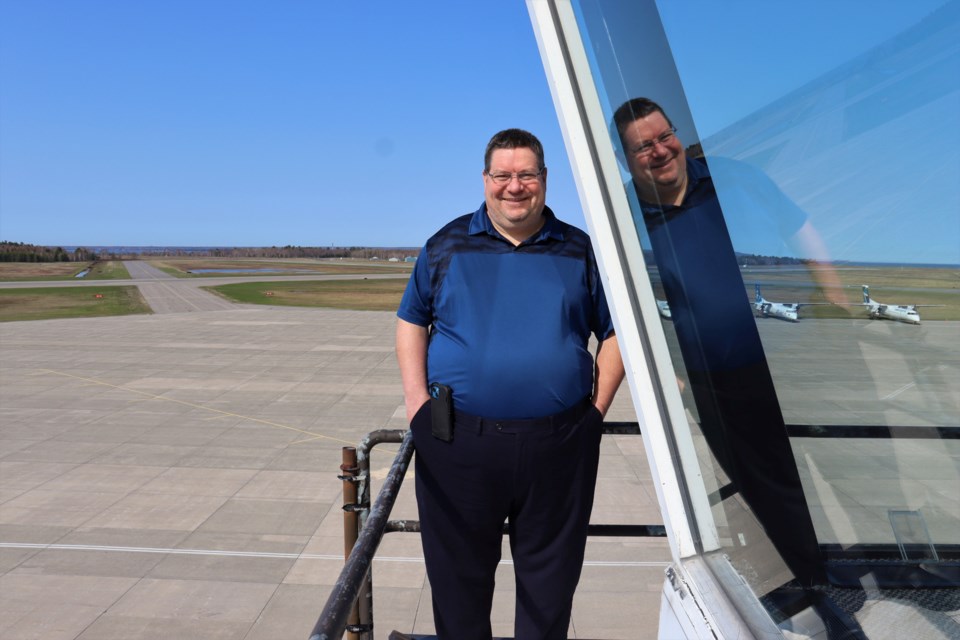Do you know how close Sault Ste. Marie came to losing its airport in the 1990s?
Designated in airport code as YAM, the airport is a unique facility in its own right as the Sault Ste. Marie Airport Development Corporation (SSMADC) celebrates its 25th anniversary as an independent airport corporation. The operation continues to surprise the community amid plenty of recent turbulence.
Terry Bos, president and CEO of SSMADC since 2004, recently reflected on two-and-a-half decades of takeoffs and landings, ups and downs.
“When the federal government was divesting itself of regional and smaller airport operations in the 1990s, most cities took over operations or set up corporations to do so, but our city council did not want to own or operate the airport,” Bos said.
“If someone didn’t step in, the airport would have closed, as it was losing a million dollars a year.”
After a feasibility study was completed in March of 1998, SSMADC took over YAM, making it one of the only regional airports in Ontario that is privately owned and operated. The disadvantage of the model is that the SSMADC still has to pay municipal taxes, unlike neighbouring regional airports like Sudbury, North Bay, and Timmins.
The airport raises its own revenue through user fees, leases, parking and improvement fees to cover its operational and capital expenses. The corporation also pays municipal taxes.
As a not-for-profit, surpluses are reinvested into the airport and the community. Close to $60 million has been reinvested back into the facility in upgrades, including $10 million for the runways.
In terms of community contributions, there is an annual charity golf tournament, a charitable giving program, and charity events that are sponsored and run by the airport.
For this anniversary, the SSMADC created four new scholarships of $2,500 each for Sault College aviation students, the amount playing off the 25-year anniversary. They made donations to the Sault College student union food bank, the Sault Ste. Marie Soup Kitchen, and Every Breakfast Counts.
“We believe in giving back to the community, because without it, the airport couldn’t survive and wouldn’t be here,” Bos said. “In helping the most needy in the community, it makes us all stronger.”
Some of the highlights over the years that stand out for Bos include the Snowbirds airshow; the renaming of the entrance road to Doctor Roberta Bondar Parkway in 2017 on the 25th anniversary of her space flight; welcoming the Sault’s double Olympic gold medal winners home; and the inaugural flight of Porter Airlines on May 4, 2011, when the airport firetrucks did a water cannon salute.
The pandemic created some of the lowest moments for the airport, and one highlight.
“The industry is based on a user-pay approach, and a drop from 210,000 to 20,000 passengers zaps all of your revenue,” said Bos.
“But we had to keep the airport open for daily medevac flights, for the province’s water bomber units to be able to come and go at any time, and for police transfers. We’re also the only regional airport between Thunder Bay and Sudbury, so we need to stay open for emergency landings.”
When commercial flights ceased during the pandemic, SSMADC had to reduce staffing levels from 22 employees to 13 full-time and one part-time employee.
“We’ve recovered to 153,000 passengers, and we’d like to bring staffing levels back, but only time will tell if business travel comes back.”
One idea really took off during the pandemic, which was the reverse Christmas parade. Parade participants, including Santa, stayed in one place, socially distanced, and people drove by in the safety of their own vehicles.
“It was a great way to recognize first responders. Over 2,750 vehicles took part.”
The airport spans 1,600 acres, with 600 to 800 of those dedicated to the airfield, building, and tenant buildings. Approximately 800 acres of development land with road access are currently for sale, and some of the rest was used to diversify revenue streams.
On the northern end of the property is Runway Park, a racing and multi-functional outdoor event space, providing an added revenue stream.
“There’s a motocross track, a grass drag strip, a mud bog pit, a clay oval, a bar, and a washroom facility,” said Bos. “We operated it for almost six years before turning it over to Ryan Nolan to run his motocross academy, snowcross, and snow drags. Basically, it gives something for the Sault to do, while generating some revenue for us.”
The airport is almost a city on its own, with its own water tower, and sewage treatment plant. They maintain all their own roads and buildings, including snow removal, and ice control. They have their own security contractor, firefighting equipment, and first response team for aircraft fires and medical emergencies. To further diversify revenue, a barbershop will operate out of the airport starting in early summer.
In the future, Bos wants SSMADC to be recognized as the best regional airport in the country. To do that, diversification is still top of mind.
“COVID drove home that you can’t rely on just passengers to stay open, so we’re always looking to diversify,” Bos said.
“We’d like to get more tenants, and more airline service, like WestJet, again. We just redid our crosswind runway in 2022 and main runway in 2001, so we’re also looking to refresh the airside of our buildings and improve the ground side façade, landscaping, and layout.”

